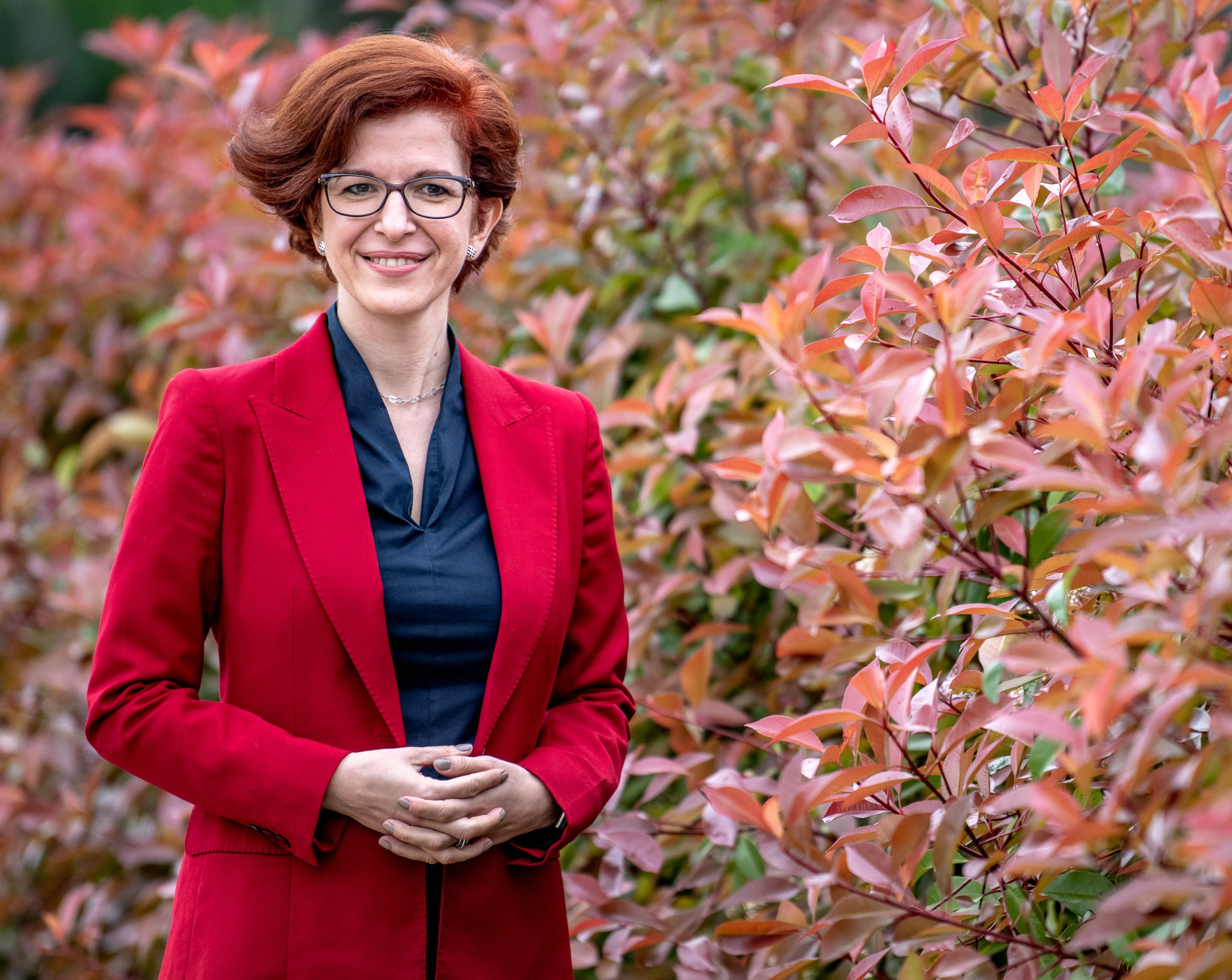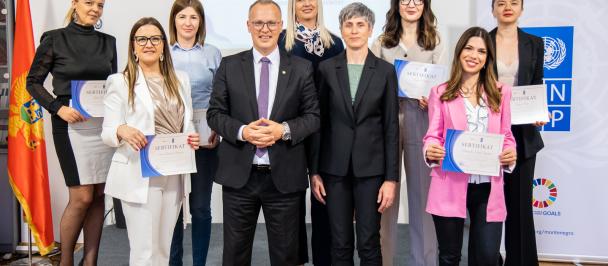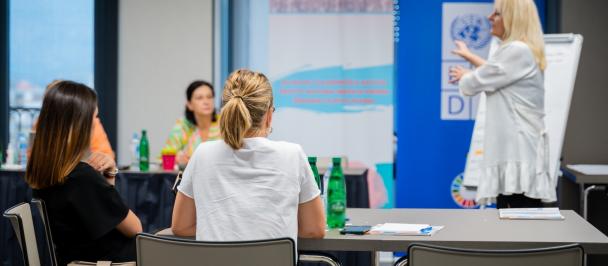UNDP Resident Representative for Montenegro Daniela Gašparikova’s Interview for Portal Analitika
Gašparikova: Montenegro and Bosnia and Herzegovina are still at the bottom in terms of the representation of women in the legislative power
January 12, 2022
UNDP Resident Representative for Montenegro Daniela Gašparikova’s Interview for Portal Analitika:
Women are represented in significant numbers in public administration. Despite that, the most responsible positions in public administration traditionally belong to men, so in Montenegro there have never been more than four female ministers in the Government, regardless of the number of ministries.
Can we hope, or perceive the future in which gender equality in Montenegro, would be more than words and exist in action? Do we need a radical revolution and radical changes in all structures of society – from family to state- and how do we stand on these issues in relation to the Western Balkans? These were just some of the topics we discussed with the UNDP Resident Representative for Montenegro, Daniela Gašparikova.
She also talked for Portal Analitika about how to increase the representation of women in STEM professions, and reflected on the progress of Montenegro in terms of the obligation to achieve gender equality within public administration.
Although women's rights and achieving gender equality in Montenegro are declaratively supported, Gašparikova notes that most of the indicators that measure implementation in practice show that this issue is not among the priority ones.
Despite the progress made in certain segments, she reminds that Montenegrin society faces the problems such as violence against women, a small percentage of women in decision-making positions, discrimination against women and the traditional division into male and female roles and jobs.
“If we want to engage in a dialogue on the country's socio-economic recovery, agricultural development, climate change, democratization and open institutions, digitization of society, entrepreneurship, the fight against corruption, security – we must involve women in this process and enable full use of their potential,“ Gašparikova says.
Women continue to face a glass ceiling in their career advancement
Our interlocutor reminds that Montenegro is a party to the Convention on the Elimination of All Forms of Discrimination against Women, and that it undertook the responsibility to ensure equal participation of women and men in public life, decision-making and formulation of policies.
“Women are represented in a significant number in public administration. However, it is evident that women continue to face the glass ceiling and walls, which slow them down in their career advancement. Thus, the most responsible positions traditionally belong to men, so there have never been more than four female ministers in Montenegro in the Government, regardless of the number of line ministries“, our interlocutor notes.
As she points out, the public administration should be representative in terms of structure and offer a stimulating and adequate working environment for the development of all professionals, professional growth, and talent development within institutions, regardless of differences, including gender.
“This includes gender balance in public administration decision-making positions as a priority goal, managerial responsibility for achieving this goal and creating adequate medium-term measures to overcome systemic barriers that prevent women from advancing to decision-making positions in professional public administration careers because they decided to start a family,“ she added.
Cultural norms and prejudices still hold us back unconsciously
As our interlocutor emphasizes, sectoral segregation in public administration is an issue that requires special attention on the path to achieving gender equality.
According to Gašparikova, it still exists and is most visible in traditionally male professions, military and police, with only 11% female soldiers and 20% female police officers, but also in the education sector, where women make up the majority or about 97% of all employees, while, according to available data, they do not cover more than about 40% of principal positions in secondary schools.
“The topic of gender equality in public administration is more than mere statistics on the number of employed women and men. The other face of public administration is public policy, the content of which must reflect the interests of both citizens, by collecting data, analyzing them and protecting the interests of citizens and providing equal opportunities for all. However, this is easier said than done, because cultural norms and prejudices still hold us back unconsciously,“ Gašparikova emphasizes.
He points out that a UNDP survey showed that as many as two out of three employees in the institutions believe that the issue of gender equality is being pushed too hard today.
“However, two-thirds of women employed in public administration will testify that men have greater rights. At the same time, the social environment is very demanding and citizens nurture gender inequality. Half of them report that it is impossible to achieve full gender equality, that successful women must inevitably neglect their families, that the employer has the legal right to ask for confirmation that the job candidate is not pregnant, etc. “, our interlocutor notes.
She adds that UNDP welcomes strengthening the principle of gender equality in the Public Administration Reform Strategy, believing that Montenegro will increase its ambition to make gender equality an essential part of the attitudes and perceptions of both public administration employees and citizens.
“Together with accepting gender equality, public administration reform must be based on permanently built capacities and institutional infrastructure for ensuring equality at all levels and the application of both domestic laws and international conventions in numerous spheres – from violence, safety at work, participation in decision-making, economic policies and entrepreneurship, participation in peacekeeping missions and ensuring peace and security at home,“ Gašparikova said.
Public policies must rely on knowledge for the 21st century
According to her, it is an extensive and responsible job that cannot be in the competence of one ministry or sector, but in which everyone must be involved, with full responsibility for its successful implementation. Of course, even without the usual blaming game and searching for answers on other addresses.
“We have seen on the example of the COVID-19 pandemic how important a fast, reliable, inclusive, transparent transformation of all public sectors in the function of citizens is. The pandemic has shown us that we must overcome the barriers that hold us back and that public policies must rely on knowledge and skills for the 21st century, and be accessible, inclusive and innovative,“ Gašparikova said.
She observes that digitization has already brought many benefits in terms of women's social and economic empowerment.
“However, without adequate and well-thought-out development, it can become an instrument for the reproduction of stereotypes, traditional convictions, and thus the deepening of the gender gap. Therefore, I want to emphasize the importance of short-term and long-term investments in knowledge, similarly and equally in all people - girls and boys, women and men. The results will come from investments in science, research and technology, innovations“, says our interlocutor.
Poor visibility of WB women in STEM areas is expected
There are a large number of occupations that fall under the acronym STEM (science, technology, engineering and mathematics). They are still in short supply in these areas, even though they are mostly well paid, and as Gašparikova told us – women in the Western Balkans perform only about 14% of jobs in said areas.
“Poor visibility of women in STEM areas is expected, given the current practices by which girls are steered towards traditional “female“ occupations. The state itself does not have detailed statistics when it comes to monitoring these trends, but those available indicate that girls and boys have equal chances in choosing education for their future occupation, even in the field of STEM,“ she added.
She says that it should be borne in mind that, when it comes to the overall results of education, 67% of the population with a degree in specialist studies and 61% with a master's degree are women. So, as he notes, we see even better learning outcomes in the education system in women.
“Nevertheless, the fact that women are the most educated part of the population is not reflected in the labor market, because they make up only 44% of the employed population, and they are not adequately represented in higher income sectors, such as IT or banking,“ Gašparikova said.
Consciously or unconsciously, as she points out, prejudices that are present in the family, the wider community and in the education system, affect the communication and formation of attitudes of boys and girls about “gender-appropriate professions“ in the early stages of their lives.
According to her, this often influences career choices in later life and goes hand in hand with the invisible cultural orientation of women to their family and reproductive roles.
“This is important because we live in a world where technological progress is extremely fast, and digitalization has completely changed our way of life, the entire labor market, and even decision-making processes. We had witnessed how important digitalization is when the COVID-19 crisis began, and when ICT skills became a condition for economic survival both globally and in Montenegro, virtually overnight. Here, too, men had the advantage, because as many as eight out of ten ICT specialists are men, and these are mostly the best paid and most sought-after jobs, which were the least endangered during the pandemic,“ Gašparikova reminds.
In this sense, as she points out, thinking about gender aspects is equally important in the digital transformation of Montenegro, because the absence of women from the fast-growing professions of the future is a deprivation of the development opportunity of society as a whole.
“The greater presence of women in STEM areas is an indirect indicator that the country has the right approach when it comes to women's economic empowerment. Therefore, UNDP supported the establishment of the Regional Women in STEM Network, because we want to encourage increased competitiveness of women and faster adaptation to the labor market's needs in STEM, digital and green economy sectors,“ she added.
Albania leads by example – the Government sets the record in the Balkans and Europe
Women in the Western Balkans are fighting for equality in all spheres in the demanding post-socialist conditions of transitional democracy. In this context, UNDP research for this region has shown that women are underrepresented in decision-making positions at both local and national levels.
“The key indicator of democratization and development of a society is the representation of women in decision-making positions. Unfortunately, today there is no country in the world that has achieved full gender equality, not even Sweden, which we perceive as a model,“ Gašparikova said.
In that context, she points out, Montenegro and Bosnia and Herzegovina remain in the last place in the Western Balkans
“We see this, for example, in the data on the representation of women in the legislative branch, which for the second term in a row since the beginning of the application of gender quotas does not reach a minimum of 30% of women in the Parliament. The current percentage is 27%, while in Northern Macedonia and Serbia it stands at 40%, Kosovo – 34%, Albania – 33% and Bosnia and Herzegovina – 26%. Mandatory quotas have so far proved to be the best mechanism for increasing the number of women in politics,“ she said.
She also believes that today's percentage in the parliaments of the region is largely due to quotas in the Election Law, which the parties had to apply – sometimes reluctantly. However, the introduction of quotas led to a larger number of party candidates of both sexes.
“It turned out that quotas have changed parliaments, society has matured, and parties are gradually becoming more responsible on this issue. Women's political participation and responsible application of quotas are directly dependent on the overall degree of emancipation of society, and especially on the sensitivity of the media and the existing mechanisms for financing women in politics,“ Gašparikova says.
She reminds that a government with 70% female ministers was recently elected for the first time in Albania.
“This is a historic achievement for the entire Western Balkans and Europe, which makes Albania a kind of a role model that the barriers faced by women in politics can be overcome by decisive policies,“ our interlocutor added.
According to her, the presence of women in politics is important for breaking stereotypes, supporting diversity and inclusion as universal values in society, and encouraging new generations.
“That is why the greatest responsibility of political parties is to nurture and develop political cadre, invest in capacity building and ensure intra-party participation of women. It is also important to ensure inter-party cooperation of women politicians according to the Women's Political Network model, because they all face the same challenges.
Just take a look at the example of violence against women: as the number of women in politics and the public sphere grows in general, so does violence against women move from the private to the public. Although this is a negative phenomenon that we are currently seeing, if it generates an adequate response, that is – action, in the medium term it can have a catalytic effect on boldly facing violence against women, anywhere,“ Gašparikova points out.
The framing of public policies does not apply
When it comes to the standardization of the procedure for shaping public policies, our interlocutor adds that it already exists as an obligation prescribed by the Law on Gender Equality, but due to inconsistencies – it is not applied.
“In addition to this, no institution will be left without a part of its budget, nor will anyone be degraded if the strategy or policy of that institution is not gender sensitive or is not done on the basis of gender analysis. Survey on gender equality among employees in public administration shows that 80% of employees in institutions believe that gender equality is the job of only one person, while 20% believe that all employees in the institution should deal with it,“ Gašparikova says.
In fact, the advanced concept applied by modern states requires, as she notes, that every public policy be created according to the needs of all citizens, and that the institutions strictly take this into consideration.
“This is done in a way that examines the needs of different groups and the way policy can affect them. Certainly, the most important in this approach are human capacities and knowledge within the institution, which will make basic gender analyzes based on the collected data and inform policies, programs and strategies, as well as budgets. We are of the opinion that in the continuation of the process of public administration reform, there is room to take this topic more seriously and to solve it systematically,“ Gašparikova said.
Finally, as an example, she cites the fact that in the past 12 months, as many as 87% of employees in public administration in Montenegro did not attend trainings in the field of gender equality.

 Locations
Locations




